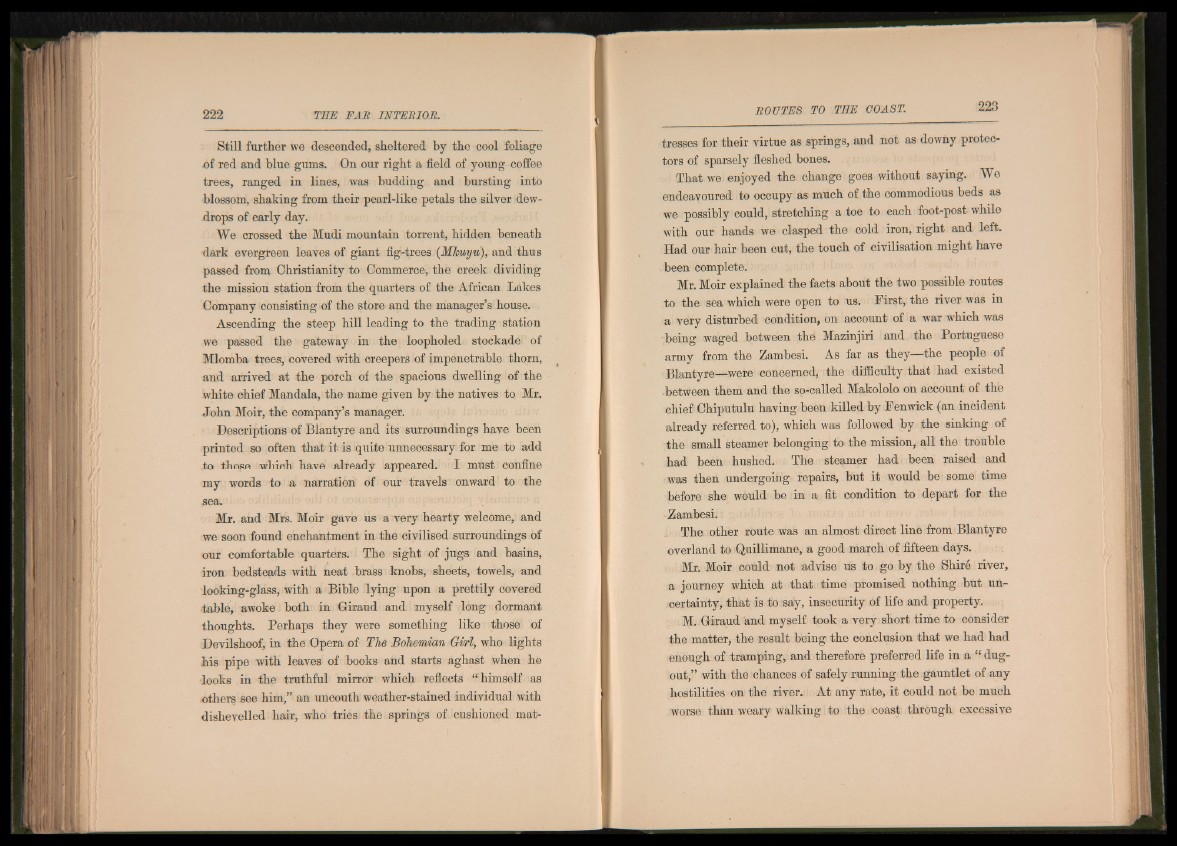
Still further we descended, sheltered by the cool foliage
-of red and blue gums. On our right a field of young coffee
trees, ranged in lines, was budding and bursting into
blossom, shaking from their pearl-like petals the silver dew-
drops of early day.
We crossed the Mudi mountain torrent, hidden beneath
dark evergreen leaves of giant fig-trees (MJcuyu), and thus
passed from Christianity to Commerce, the creek dividing
the mission station from the quarters of the African Lakes
Company consisting of the store and the manager’s house.
Ascending the steep hill leading to the trading station
we passed the gateway in the loopholed stockade of
Mlomba trees, covered with creepers of impenetrable thorn,
and arrived at the porch of the spacious dwelling of the
white chief Mandala, the name given by the natives to Mr..
John Moir, the company’s manager.
Descriptions of Blantyre and its surroundings have been
printed so often that it is quite unnecessary for me to add
to those which have already appeared. I must confine
my words to a narration of our travels onward to the
sea.
Mr. and Mrs. Moir gave us a very hearty welcome, and
we soon found enchantment in the civilised surroundings of
our comfortable quarters. The sight of jugs and basins,
iron bedsteads with neat brass knobs, sheets, towels, and
looking-glass, with a Bible lying upon a prettily covered
table, awoke both in Giraud and myself long dormant
thoughts. Perhaps they were something like those of
Devilshoof, in the Opera of The Bohemian Girl, who lights
his pipe with leaves of books and starts aghast when he
looks in the truthful mirror which reflects “ himself as
others see him,” an uncouth weather-stained individual with
dishevelled hair, who tries the springs of cushioned mattresses
for their virtue as springs, and not as downy protectors
of sparsely fleshed bones.
That we enjoyed the change goes without saying. We
endeavoured to occupy as much of the commodious beds as
we possibly could, stretching a toe to each foot-post while
with our hands we clasped the cold iron, right and left.
Had our hair been cut, the touch of civilisation might have
been complete.
Mr. Moir explained the facts about the two possible routes
to the sea which were open to us. First, the river was in
a very disturbed condition, on account of a war which was
being waged between the Mazinjiri and the Portuguese
army from the Zambesi. As far as they—the people of
Blantyre—were concerned, the difficulty that had existed
between them and the so-called Makololo on account of the
chief Chiputulu having been killed by Fenwick (an incident
already referred to), which was followed by the sinking of
the small steamer belonging to the mission, all the trouble
had been hushed. The steamer had been raised and
was then undergoing repairs, but it would be some time
before she would be in a fit condition to depart for the
Zambesi.
The other route was an almost direct line from Blantyre
overland to Quillimane, a good march of fifteen days.
Mr Moir could not advise us to go by the Shire river,
a journey which at that time promised nothing but uncertainty,
that is to say, insecurity of life and property.
M. Giraud and myself took a very short time to consider
the matter, the result being the conclusion that we had had
enough of tramping, and therefore preferred life in a “ dug-
out,” with the chances of safely running the gauntlet of any
hostilities on the river. At any rate, it could not be much
worse than weary walking to the -coast through excessive